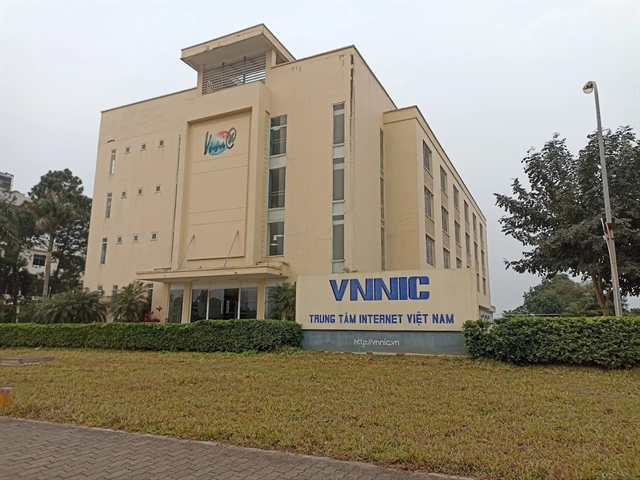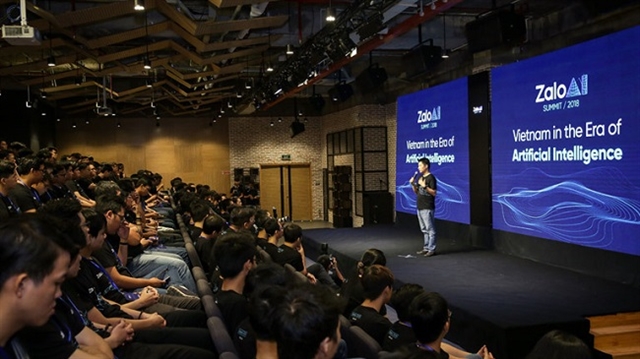 Society
Society

Like many other Asian countries, Việt Nam is racing its regional counterparts to spur economic innovation with artificial intelligence (AI). Experts say voice recognition technology, AI, blockchain and big data will be major trends in 2020.

|
| Ki-Ki, the first Vietnamese chatbot, was presented at Zalo AI Summit 2018 in late December 2018, where Viet Nam’s AI community showed optimism about the development of AI. — Photo brandsvietnam.com |
HÀ NỘI — Like many other Asian countries, Việt Nam is racing its regional counterparts to spur economic innovation with artificial intelligence (AI). Experts say voice recognition technology, AI, blockchain and big data will be major trends in 2020.
Although Việt Nam is on the back foot in terms of AI and faces huge challenges, including a weak technology sector and lack of human resources, the country has managed to build a vibrant AI ecosystem and set up a plan for research and development with breakthrough strategies.
At the same time, many organisations and businesses in Việt Nam are now trying to keep up with their foreign rivals by building technical skills to shape raw ideas into fully serviceable and effective AI applications.
Viettel Cyberspace Center (VTCC), established in 2014, has focused research on AI. VTCC.AI focuses on providing three services for speech processing, including TTS (Text to Speech), Speech to Text, and Voice Wake-up. The products can be applied to a variety of platforms, such as reading newspapers, books, or in automated customer care systems.
Zalo AI plans to develop applications such as Zalo Brain and Zalo Assistant.
At the Zalo AI Summit conference held at the end of 2018, the Ki-Ki virtual assistant was officially launched with the ability to recognise the voice of Vietnamese people and answer with northern, central and southern accents.
ELSA is an English pronunciation training application founded by Van Dinh Hong Vu. The application uses AI to recognise voice accuracy and help users improve their skills.
AI is also providing strong support in the field of transport. Self-driving cars with AI can automatically avoid people or obstacles, and are being used in the Ecopark urban area in Hà Nội. In HCM City, AI has been used to help monitor traffic cameras and adjust traffic lights.
In health, AI is also being employed to improve quality, efficiency, overcome risks, medical incidents and reduce hospital overcrowding.
The 115 People's Hospital and Gia An 115 Hospital in HCM City are the first two hospitals in Viet Nam to apply Rapid Artificial Intelligence software in stroke diagnosis and treatment.
According to Ngô Quốc Hưng, Creative Director of COTAI – the centre for talents in AI – who has been teaching AI to students of the Lê Hồng Phong High School for the Gifted in HCM City, AI is no longer unfamiliar to high school students. In their eyes, AI is now an interesting subject which offers useful information and applications.
“In several more years, Việt Nam will have many good engineers in AI and the number of start-ups in AI will increase,” Hưng said.
Tú Nguyễn, managing director of VietA.I Community, who has been working for 10 years in emerging technologies, said there were 25 workers in the international payment division of HSBC five years ago. Nowadays, when the work volume is five times higher, the division only needs three workers, because a big workload is now undertaken by computers.
Also according to the expert, at Minh Long II Technical Ceramics factory in Bình Dương province, 70 per cent of work is being undertaken by robots.
“This shows that AI has penetrated into all areas in Việt Nam, raising the need of developing the labour force in the field of AI,” he said.
Long way to go
Đặng Hoàng Vũ, Science Director of the FPT Corporation, said that 2020 will be the year of "popularising AI".
And while Việt Nam has a lot of potential for AI development, most AI start-ups are still at a very early stage of development.
Việt Nam’s AI start-ups are still facing many difficulties when resources are limited, training is inadequate and many high-skilled workers choose to work overseas.
According to the 2018 Vietnam AI Landscape Report published by Nexus Frontier Tech initiative RubikAI, almost 60 per cent of AI companies in Việt Nam have been in business for less than two years, and only 34 per cent have raised more than US$200,000 from external sources.
Also according to the report, two other big challenges for Việt Nam are a shortage of talent and the ability to approach data.
Vũ said that in order to develop faster than its competitors, the Government needs to have policies to socialise AI and encourage businesses to use artificial intelligence in business activities.
He also emphasised the importance of effective connection among the community and major businesses, among the components of the AI ecosystem. — VNS